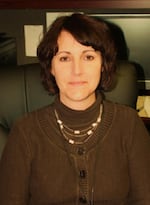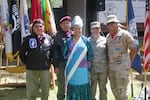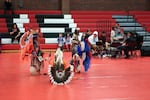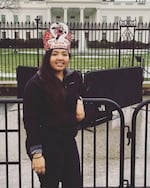In the beginning, Mike McNeil’s lawyers thought he was nuts — or just a jerk with an ax to grind.
Then they saw his case against Chemawa Indian School and they apologized.
“They said ‘We could never have imagined that all of the stuff you were telling us was even partially true,’” McNeil said.
McNeil was a special education teacher at Chemawa, a federally run boarding school for Native youth in Salem, Oregon.
Related: Chemawa Indian School
Back in 2011, he needed a lawyer because he wanted to file a lawsuit accusing the school and campus administrators of nepotism and retaliation. McNeil had applied for a job coordinating the school's special education program. Instead, the position went to the superintendent’s wife.
McNeil also believed the federal government wrongly fired him over his complaint. The way he says he was treated wasn’t his only frustration with Chemawa.
“One of my main concerns was that we weren't doing enough to meet the needs of kids with disabilities,” McNeil said. “I was aware of a number of technical law violations that I made administrators aware of, that they didn’t seem to be interested in or willing to correct those.”
John Burgess was a year out of law school when an older, busier attorney handed him McNeil’s case.
He initially thought it was a dead end.
“Whistleblower cases are fairly difficult to bring and they’re not usually successful,” Burgess said.
At trial, the school said it fired McNeil because he was hostile and threatening to fellow staff members.
The Bureau of Indian Affairs didn’t grant interviews with current school administrators who supervised McNeil. In emails at the time, one called him a "ticking time bomb." Another later referred to him as a “loose cannon” and said some fellow teachers were afraid of him.
“I was afraid of him, too,” one teacher said in statement for the case. “I wanted to stay away from him. He gave me the impression anything could set him off, i.e. he could become angry, holler, slam a door, possibly throw a file at me ...”
Other teachers who worked with McNeil disputed that account and said he was passionate but not unprofessional.
Federal officials at the Bureau of Indian Education, or BIE, told Chemawa they lacked enough documented problems on McNeil to fire him. So, court documents show, school administrators went looking for more. Records indicate the additional evidence they presented against McNeil was created after he had been fired.
After that, the school found more, according to court documents.
“They got two employees to provide false statements that he had engaged in threatening conduct toward them,” Burgess said. “At trial, the court didn’t find any of their statements that he had engaged in threatening conduct credible.”
McNeil won. A judge determined the superintendent's wife lacked the credentials required for the job and that McNeil wouldn't have been fired if not for his whistleblowing. The judge ordered the school to pay McNeil for the remainder of his contract and any back pay, as well as attorney's fees for Burgess. The judge also ordered the Bureau of Indian Education, the federal agency that oversees Chemawa, to reinstate McNeil. Technically, he was reinstated. But by then his BIE contract was up. The school didn't renew it, so he never returned to Chemawa. He now works investigating adult foster homes for Northwest Senior and Disabilities Services.
“This case stuck with me because it just seemed so sad that this school was being run in this way,” Burgess said.

Attorney John Burgess has handled several legal complaints from former staff members at Chemawa Indian School.
Rob Manning / OPB
Over the next few years, Burgess became a de facto attorney for several Chemawa workers who say they’ve been treated unfairly by an insular management team. He’s represented two individuals at the federally run school in legal proceedings and consulted with several others.
“I had never seen — outside of a closely held business — never seen nepotism or cronyism engaged in so rampantly and openly,” Burgess said.
Family connections abound at Chemawa. Those connections don’t necessarily violate any law governing the federal school or its employees.
But in interviews, emails and court documents, Chemawa staff members said they have observed nepotism and favoritism over the past several years within the Bureau of Indian Education that formed a roadblock to accountability. They say it also raised doubts about whether the federal government’s hiring processes are truly designed to ensure the most qualified staff are in place to serve the students who arrive at Chemawa.
After Chemawa
A number of past Chemawa leaders went on to work other BIE jobs after their time at the school.
Source: OPB Staff reporting
“There is a lot of nepotism and favoritism. It seems like a family affair or a family business. It is more about whom you know,” one teacher wrote in a 2012 affidavit given for McNeil’s case.
Another teacher put it more bluntly: “In my opinion, Chemawa is an employment opportunity for friends of the administration.”
Meanwhile, as Chemawa retained a largely non-Native administration, students have questioned why a school for Native youth has so few examples of Native people in positions of leadership.
Conflicting Views Of Family Connections
The federal government has long-established anti-nepotism rules. The Bureau of Indian Education issues nepotism guidelines to help its staff abide by those rules. The guidelines are designed to avoid “the possibility of favoritism, conflicts of interest, or management disruptions.”
Family members supervising each other does not by itself violate those nepotism guidelines, according to the BIE. That threshold also requires at least the appearance that an employee influenced some sort of favorable action toward a relative.
What BIE employees cannot do is hire, promote or advance a relative. It also means no advocating for relatives to be hired or advanced within the agency.
Superintendent Lora Braucher said Chemawa adheres to the bureau’s strict nepotism policy.

Chemawa Superintendent Laura Braucher
Chemawa Indian School
“We do have people who are related,” Braucher said. “Like maybe a manager who might be related to a staff member. They are not allowed to be their supervisors.”
Likewise, any outside applicants related to Chemawa staff members must disclose that. Those staff members are then prohibited from participating in the hiring process, Braucher said.
Braucher herself is an example of an outside hire: BIE conducted a national search and selected her in 2014 based on her experience turning around underperforming public schools in Florida.
Braucher said she has made progress improving academics at Chemawa. That includes increasing college preparation and raising test scores, according to data Braucher provided to OPB.
In an interview, she recounted school board meetings where students told her and others that Chemawa had changed their lives.
Braucher attributed some of the school’s family connections to “Indian preference,” a policy designed to ensure the school hires Native staff to serve Native students.
In one regard, those close connections are a sign of the kind of community that has made Chemawa so cherished by so many students and staff over the years.
“There are a lot more familial relationships at our school than there are in local schools, particularly public schools,” Braucher said. “When you’re hiring Native American employees, a lot of times they will tend to be from the same tribes. Especially if they’re from local tribes. A lot of times you’ll have more staff who are related to each other.”
Family connections exist at Chemawa in abundance among both its Native and non-Native staff. The sheer number of them clouds the distinction between acceptable staff relationships and what could be cases of favoritism or nepotism.
“You learn real quick you don’t say anything bad about anyone till you know,” said Ted Mack, who retired from the school in 2016 after more than 20 years.
For Mack, family working with family hasn’t been a problem for Chemawa.
“I don’t know if they’re easier on them or if they’re tougher on them than they would be anyone else,” Mack said.
Mack served as acting principal while his brother taught math at the school. He didn’t supervise his brother, he said. He said the school has improved tremendously over the past few decades — a testament to the staff who were in place.
“When I went to Chemawa, Chemawa at that time was a real rough place,” he said. “The last half of my career, the emphasis went from just getting a high school diploma, to what are you going to do now?”
Other examples of family relationships include former superintendent Don Tomlin, who former staff members say hired his brother onto the academic staff. This was after former superintendent Craig Wellman’s wife was hired as a special education coordinator, which became the focus of McNeil’s case.
School academic principal Amanda Ward’s aunt is the school’s librarian. That librarian’s husband, Ward’s uncle, was previously school principal. BIE officials would not permit OPB to speak with Ward and efforts to reach her through other channels were unsuccessful.
Former school board member Delores Pigsley, who grew up on the Chemawa campus, has a son and daughter-in-law who both work at the school. Rachenda Reynosa, the school’s business manager, is her niece.
In interviews with OPB and in statements from legal proceedings involving the school, multiple staff members said Reynosa helped secure jobs for relatives at Chemawa, including her son and nephews. The Bureau of Indian Education did not grant an interview with Reynosa, and attempts to reach her through personal email and social media were not successful. Legal documents from 2016 show Reynosa’s son works as a clerk in Chemawa’s student travel department. Reynosa has said she is in charge of student travel.
“It’s still happening,” said Anita Espino, who worked in the dorms and in special education at Chemawa. “We still hire the friends of the friends or family.”

Anita Espino, a Siletz tribal member, worked at Chemawa Indian School for 28 years in both classrooms and residence halls. She left in 2016.
Rob Manning / OPB
In 2016, after she spent 28 years at Chemawa, the school did not renew Espino’s contract. Her supervisor cited problems with her behavior. Espino, a Siletz tribal member, has a pending Equal Employment Opportunity complaint against the school. She claims her supervisor discriminated against her based on her age, race and gender and because she’d filed an earlier EEO complaint.
In an interview, Espino said positions with additional stipends on top of annual salary — jobs like running the school store or coordinating the special ed department — tend to go to those favored by administrators. She said opportunities for staff to acquire additional education via Chemawa also appear arbitrary or based on favoritism.
Staff know which employees are the administration’s favorites, Espino said, “because those are the ones that get moved up.”
Current superintendent Lora Braucher said Chemawa adheres to federal guidelines and denies any improper hires. She said stipend positions are union, meaning the school must advertise them.
She said those positions are voted on by the school’s leadership team, composed of the superintendent, three assistant principals and managers for business and facilities.
If the decision involves a relative of any of those team members, Braucher said, they abstain from voting.
Many of the family connections raised by former staff members predate Braucher. The Bureau of Indian Education did not grant interviews with longer tenured administrators. Attempts to reach them outside the BIE were unsuccessful.
The People In Power
Oversight of Chemawa’s staffing comes from the federal Bureau of Indian Education, an agency plagued by budget cuts, inconsistent leadership and its own history of questionable hiring practices.
In 2016, the bureau’s director was fired after the U.S. Department of Interior’s Inspector General found the director inappropriately used his position to influence the hiring of two people: one a relative and the other someone with whom he had a romantic relationship.
That change marked 30 directors in 36 years for the Bureau of Indian Education, according to a report from Politico. Amid that turnover, numerous audits over the years have found signs of dysfunction, funding shortfalls and failing oversight of its 183 schools and the 41,000 students in its care.
BIE Schools
The BIE operates 4 off-reservation boarding schools and dozens of day schools.
Source: bie.gov, accessed November 2017
That means individual administrators at BIE schools like Chemawa operate with little consistent direction from above.
Since 2006, Chemawa has had nine superintendents. The BIE left Chemawa for entire school years with only an “acting” superintendent from an office in Seattle or Albuquerque.
During that time, school insiders say that Ward, Reynosa and Mack kept the school running and serving Native youth despite limited funding and little guidance from the BIE.
Over those same years, some of the school’s more powerful individuals rose to management from lower-level ranks at the school. That happened amidst complaints from some colleagues that they bypassed the usual competitive process and didn’t obtain the proper credentials until well after they’d already been placed in the job.
In a 2012 email obtained by OPB, one teacher wrote that a current administrator was put in a job without any real competition, and was moved out of teaching secretly and pre-selected because of previous connections with Bureau of Indian Education officials.
While researching cases against the school, attorney John Burgess said he also discovered staff members at the school who held positions they weren’t qualified for under federal regulations.
OPB asked the BIE for evidence certain administrators possessed the necessary qualifications for their posts. The agency did not respond.
“There is a nepotism policy that is in place and we go by that and make sure it is adhered to,” BIE Director Tony Dearman said.
Personnel decisions made by Chemawa management are then processed by the federal agency’s human resources department in Albuquerque, which oversees Chemawa’s hiring practices.
“You’re going to have family and it is monitored,” Dearman said. “The decision is not made solely at the school level.”
John Burgess has seen a lot of labor complaints since his first case against Chemawa. He said the reality is more nuanced than it might seem.
“They have power. People in institutions where they have power and very little oversight, end up abusing it,” Burgess said. “The only way that they will stop is if someone from the outside imposes some kind of limitation on what they can do.”
He said staff and administrators likely view themselves differently.
“I’m sure that if you met these people in your everyday lives, that you’d get along with them probably,” he said. “But in their work life, they justify all kinds of conduct, based on what they do. People like to work with relatives and ... people who think like them.”
Students Want More Native Leadership
At Chemawa, most of the people at the top are not Native.
Many of the school’s dorm staff and support staff are Native, according to former staff and students. But in recent years, many of the teachers have not been. Nor have the school’s administrators.
Lisa Gonsalves, who worked at Chemawa in the 1990s and again in 2015, quit her job in student transportation last year after growing frustrations with her supervisors, claiming a hostile work environment.

Lisa Gonsalves, second from right, worked at Chemawa in the 1990s, then joined the military. When she returned more recently, conflicts with administrators forced her out.
Courtesy of Lisa Gonsalves
She and two other former staff members said they took notice when the person hired as the school’s new facilities manager was the husband of the head of the campus Indian Health Services clinic, someone they knew to be a personal friend of Braucher.
The move upset Gonsalves, who wanted to see more Native representation in the management ranks.
"You’re hiring your friends in positions that needs to be tribal members. You’re not even putting the information out there far enough to get applications,” Gonsalves said. “That’s huge. Because these kids, they’re going to respect those tribal members versus those non-tribal members. One hundred percent."
Neither Braucher nor the Bureau of Indian Education responded to multiple requests for comment about this claim. Several people familiar with trying to recruit Native professionals have told OPB that finding qualified tribal members for highly-skilled positions can be difficult because they are so in demand. Luring Native candidates to off-reservation opportunities in the Willamette Valley can be tough, too, as some potential hires may prefer to serve their own tribes closer to home.
Oregon's Native American Population
These are 2016 population demographics estimates from the US Census.
Source: 2016 US Census estimates
Five years ago, in a statement for McNeil’s court case, longtime teacher Dr. Debbie LaCroix summed up what many students and staff at Chemawa say still persists today:
“I believe if the leadership at Chemawa was inclusive of everyone in the community there would be no need for the constant games and terror attacks on the credibility of the members of the Chemawa staff who have been belittled, terrorized and threatened by the existing Administration,” LaCroix wrote.
LaCroix, a member of the Sisseton-Wahpeton Dakota Oyate tribe, was an English teacher at Chemawa for 30 years before retiring in 2013. She also served as the Chemawa teachers’ union representative. She told OPB school administrators forced her to retire. LaCroix said she contacted the BIE director about the fact that Chemawa lost five of its six Native teachers in recent years, but that led nowhere.
“Alcoholism, post traumatic stress disorder and poverty disproportionately affect Native people,” LaCroix said. “Education is the way to level the playing field, but Chemawa is run like a military school, and we are not serving our Native kids.”
At a school rooted in assimilation and later reclaimed as a symbol of home and pride for tribes across the country, recent students say they interact with few people in power who are Native.
“The school is supposed to be for you, and all you have all day is a bunch of white people telling you that you’re wrong and you’re going to do what they tell you to do,” said Shanae Conger, a former student from the Salt River Pima Maricopa Indian Community in Arizona.
“It just feels like … it never changed.”
Students at Chemawa say they have no shortage of examples of cultural insensitivity or ignorance. Administration cut short a round dance that students were planning with little regard for how they are typically carried out. Others were asked to write out step-by-step instructions for running a traditional sweat, which they say is a spiritual event and not something that can be done with a cheat sheet. One student was told he couldn’t wear bandanas with tribal symbols on campus.

Pow Wow at Chemawa Indian School back in May of 2017.
Rob Manning / OPB
In June, after receiving a complaint from a Chemawa teacher, the Freedom From Religion Foundation wrote a letter to Braucher warning of potential constitutional violations because of Christian prayer events at the school, as well campus visits from Christian groups such as Young Life.
The foundation asked for an immediate stop to the inclusion of religion in Chemawa events.
Braucher and the Bureau of Indian Education did not respond to emails asking for a response to the letter. But in the past, the superintendent has spoken about trying to serve students spiritually on the students’ terms.
“One of the things that drew me to Chemawa is because we do serve students 24 hours a day, one of the things that we get to serve them is spiritually and culturally. So I find that while I can’t necessarily share my specific faith of Christianity, I do get to pray with students,” she said.
Braucher described assemblies with drumming and singing and prayer led not by her but by a staff elder or student. The blurring of church-state distinctions is not unusual in tribal contexts. For instance, meetings involving tribal leaders and officials with the U.S. Department of Interior may include traditional blessings. But delving into spirituality at a place like Chemawa can be challenging and complex, because students come from a multitude of religious faiths back home, and the school's leadership is primarily non-Native.
As at any school, Chemawa students are expected to learn from teachers and administrators from varied backgrounds. But multiple students — including those who have found success at Chemawa and beyond — said they wish Chemawa had more Native leadership.
SuSun Fisher graduated from Chemawa in 2017 and was a member of student council and voted "Miss Chemawa," a designated cultural representative of the school.

SuSun Fisher held the "Miss Chemawa" cultural post as a senior at Chemawa. She graduated in 2017.
Courtesy of SuSusan Fisher
“The principal will say that, ‘Oh yeah, I know what you guys come from. I know who you guys are. I’ve been teaching here for how long, I’ve been working here for how long,’” said Fisher, now a student at the University of New Mexico. “But if she has, and she claims that she knows, then why isn’t it better?”
As a student council member, Fisher recalled being asked to stop a student-led protest of the Dakota Access Pipeline, the controversial oil project running through Standing Rock Sioux territory, which has been protested by tribes across the country.
When she didn’t help stop the event, and later participated in it, she said she was called into the administrative office and lectured. She said administrators told her she shouldn’t be doing that and that they were disappointed in her.
“Too many of our students come from broken homes and bad situations. A lot of them come to Chemawa to escape that,” Fisher said. “But I’m really tired of seeing people — staff and students — get walked on and silenced.
“They always tell us, ‘Oh, well if you want Native staff here tell them to apply because they get priority over us,’” she said. “So maybe I might end up working there, once I complete my degrees. I really would like to see some things change at that school.”
About This Series
This series is the result of almost three years of reporting by OPB reporters Rob Manning and Anthony Schick. After concerned staff members contacted OPB about troubles at the boarding school, Manning and Schick interviewed several dozen former Chemawa employees, students and parents and looked through hundreds of pages of records, including police reports, court records, depositions, academic reviews, financial documents and disciplinary reviews from Chemawa. They filed multiple Freedom of Information Act requests with the Bureau of Indian Education, which oversees Chemawa. Some are still pending.
The Bureau of Indian Education allowed the current director of Indian education and the current Chemawa superintendent to speak with OPB. They declined OPB’s requests to speak with other teachers and administrators on campus.
Investigate West reporter Rebecca Clarren provided background research and reporting guidance. Read her recent reporting on the educational challenges facing Native American communities here.
Charles Hudson, the intergovernmental affairs director for the Columbia River Inter-Tribal Fish Commission and Mandan-Hidatsa tribal member, reviewed the stories prior to publication with an eye toward cultural context.
For more on the Bureau of Indian Affairs’ struggles with Native education, this 2015 Politico series offers useful background.
Chemawa: In This Series
Chemawa Indian School is supposed to offer an academic home preparing students for college or careers in a safe and stable setting. It’s seen as a refuge for Native high schoolers across the West. But an OPB investigation found the Salem school struggles to spend taxpayer money wisely, educate students and even keep them safe. Concerned staff say they have been silenced and targeted by administrators in a hazy bureaucracy within the federal government.
Part 1: Life And Death At Chemawa
Part 2: What's A Chemawa Diploma Really Worth?
Part 3: Former Chemawa Staff Say Concerns Were Met With Retaliation, Bullying
Part 4: Help Wanted: Questionable Hiring And Non-Native Administrators At Chemawa
Part 5: Behind The Fence, Chemawa’s Culture Of Secrecy
